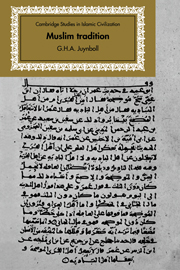Book contents
- Frontmatter
- Contents
- Preface
- Note to the Reader
- Introduction
- 1 A tentative chronology of the origins of Muslim tradition
- 2 The role of qāḍīs in the spreading of traditions
- 3 The man kadhaba tradition and the prohibition of lamenting the dead. An investigation into mutawātir traditions
- 4 An appraisal of muslim ḥadīth criticism. Rijāl works as depositories of transmitters' names
- 5 ‘Accepting traditions means knowing the men’
- Appendix I
- Appendix II
- Appendix III
- Appendix IV
- Appendix V
- Bibliography
- Index (glossary)
1 - A tentative chronology of the origins of Muslim tradition
Published online by Cambridge University Press: 04 August 2010
- Frontmatter
- Contents
- Preface
- Note to the Reader
- Introduction
- 1 A tentative chronology of the origins of Muslim tradition
- 2 The role of qāḍīs in the spreading of traditions
- 3 The man kadhaba tradition and the prohibition of lamenting the dead. An investigation into mutawātir traditions
- 4 An appraisal of muslim ḥadīth criticism. Rijāl works as depositories of transmitters' names
- 5 ‘Accepting traditions means knowing the men’
- Appendix I
- Appendix II
- Appendix III
- Appendix IV
- Appendix V
- Bibliography
- Index (glossary)
Summary
Wa-daʿ ʿ ʿanka ārāʾa ′r-rijāli wa-qawlahum
fa-qawlu rasūli ′llāhi azkā wa-ashraḥu
Abū Bakr, the son of Abū Dāwūd, the author of the SunanIntroduction
Nobody is likely to deny that the earliest origins of what later became known as the tradition literature can be traced back to the time when Muḥammad was still alive. As soon as he had established himself as the leader of the new movement and had made a sizable number of converts, his followers must have begun to talk about him and in their conversations (in Arabic aḥādīth) they must have called to mind his exploits. The memory of the prophet was thus kept alive also after he had died. The new community's cohesion was for a large part based upon the collective concept his followers had of him. More and more it was the new religion he had preached that began to bind them together, not in the first place tribal, clan or family ties, which had been the principal binding force hitherto. But the new religion was still a long way from being defined within the terms under which it became known in, say, the third/ninth century of the Hijra. The mainstays of the new religion, to which time and again Muḥammad's followers went back, which kept them together, which inspired them to more efforts in making the community stronger, were the divinely inspired utterances within a few decades after his death collected in the Qur' ān and the prophet's own example gradually taken as normative for the entire Islamic community.
- Type
- Chapter
- Information
- Muslim TraditionStudies in Chronology, Provenance and Authorship of Early Hadith, pp. 9 - 76Publisher: Cambridge University PressPrint publication year: 1983

